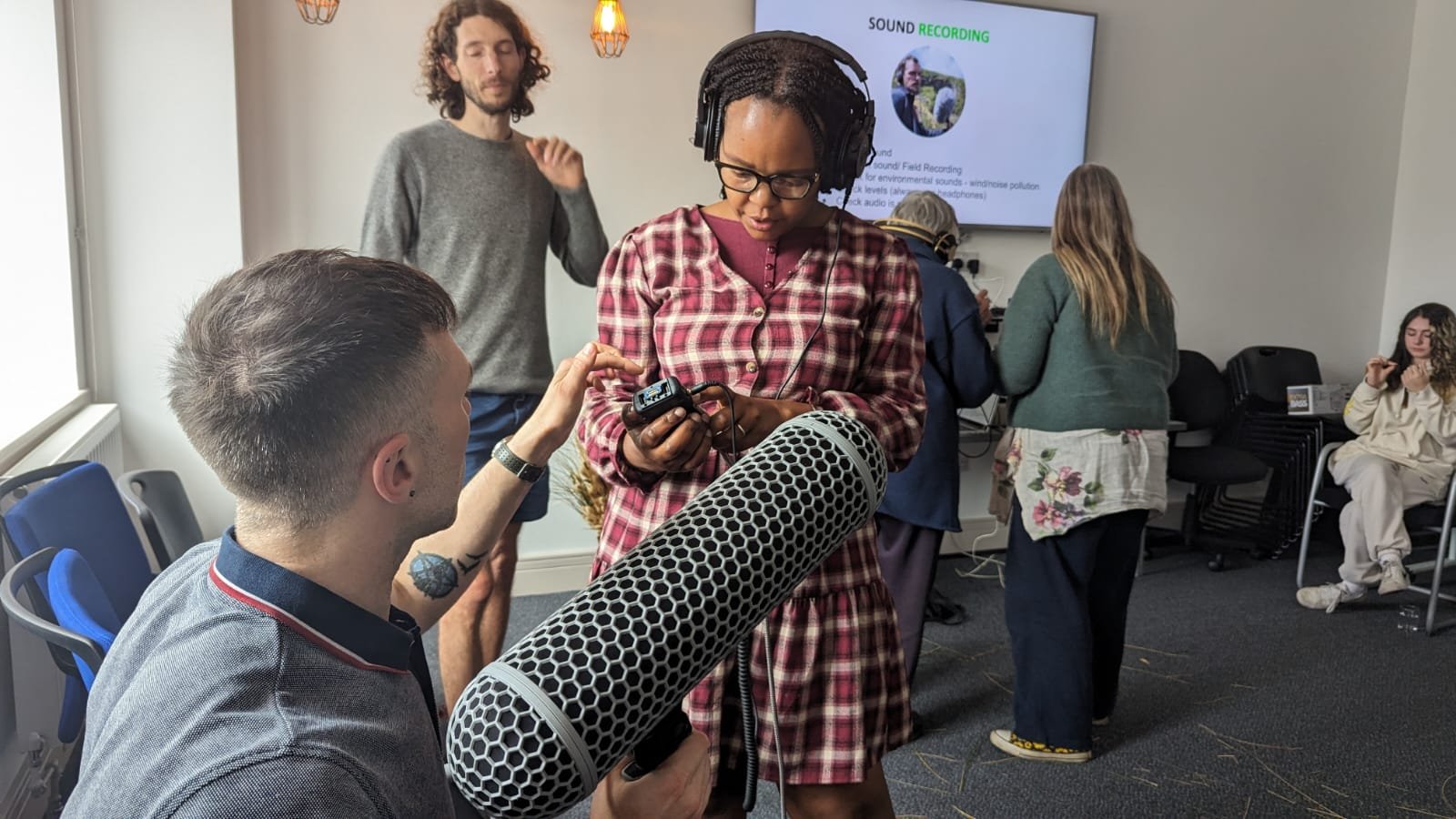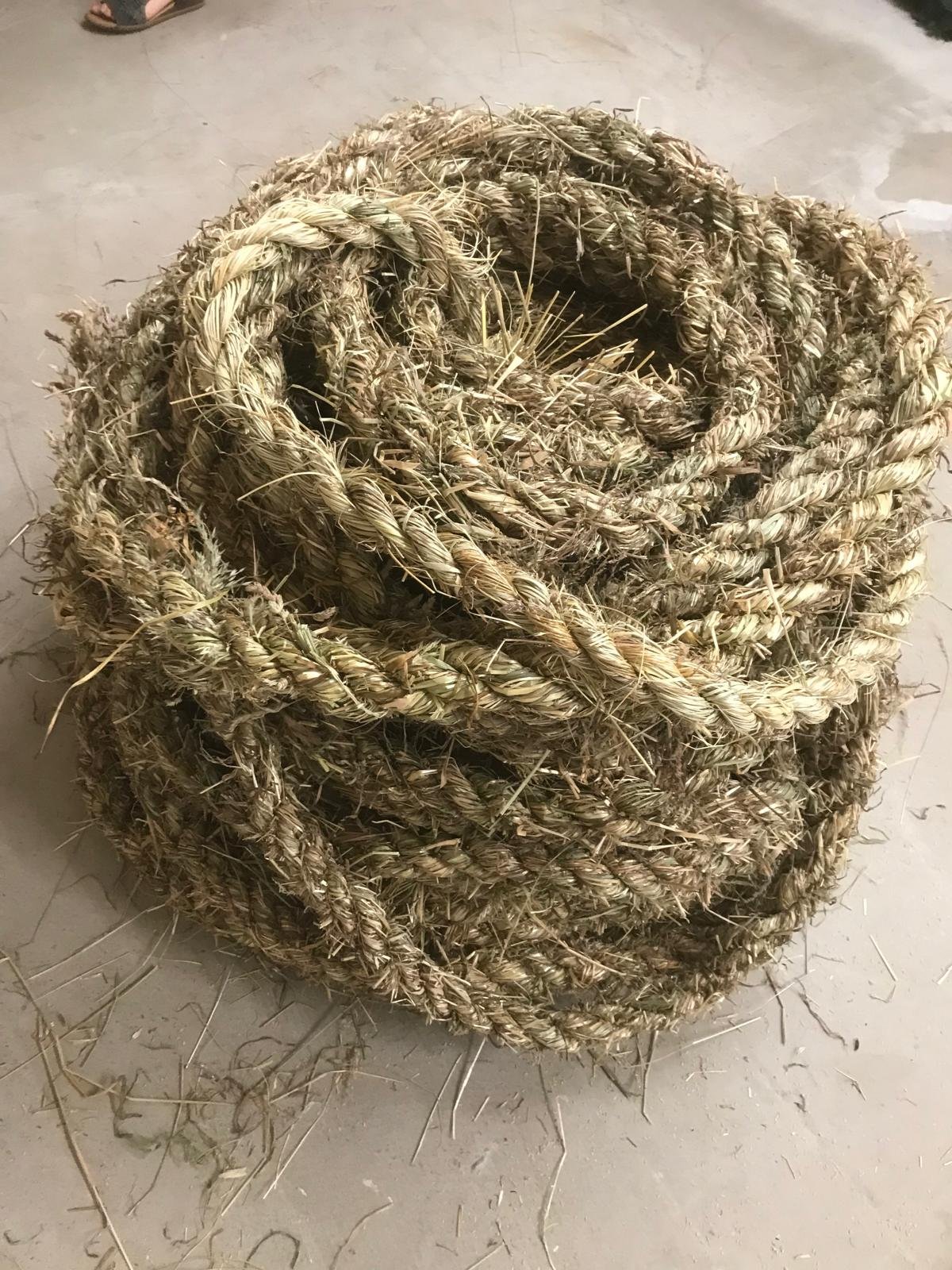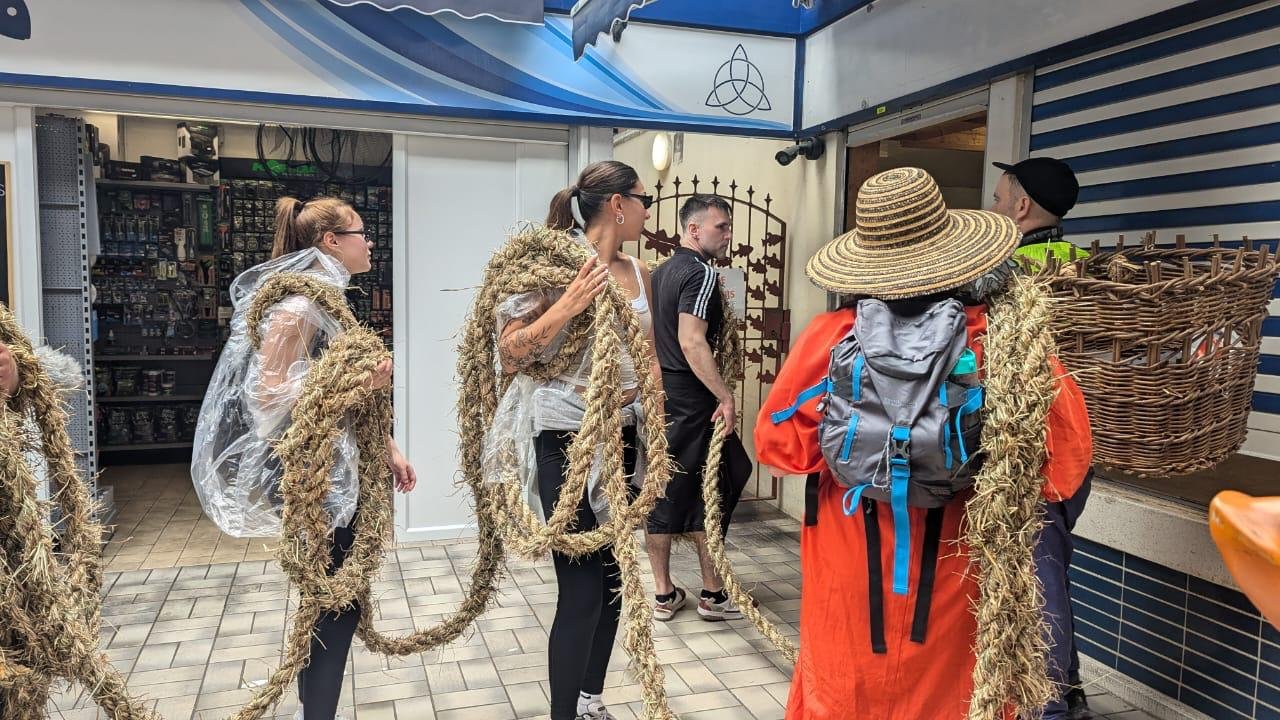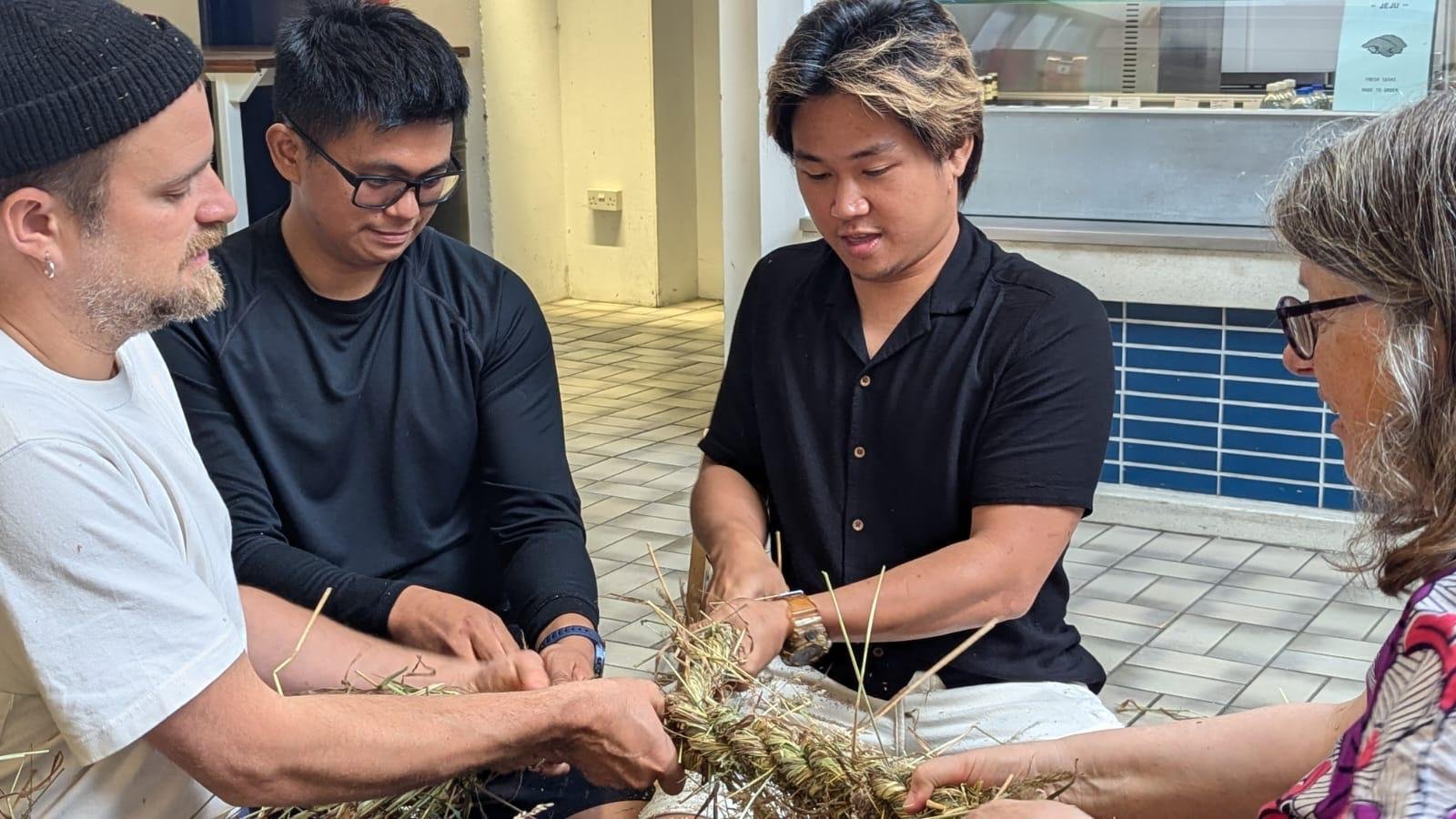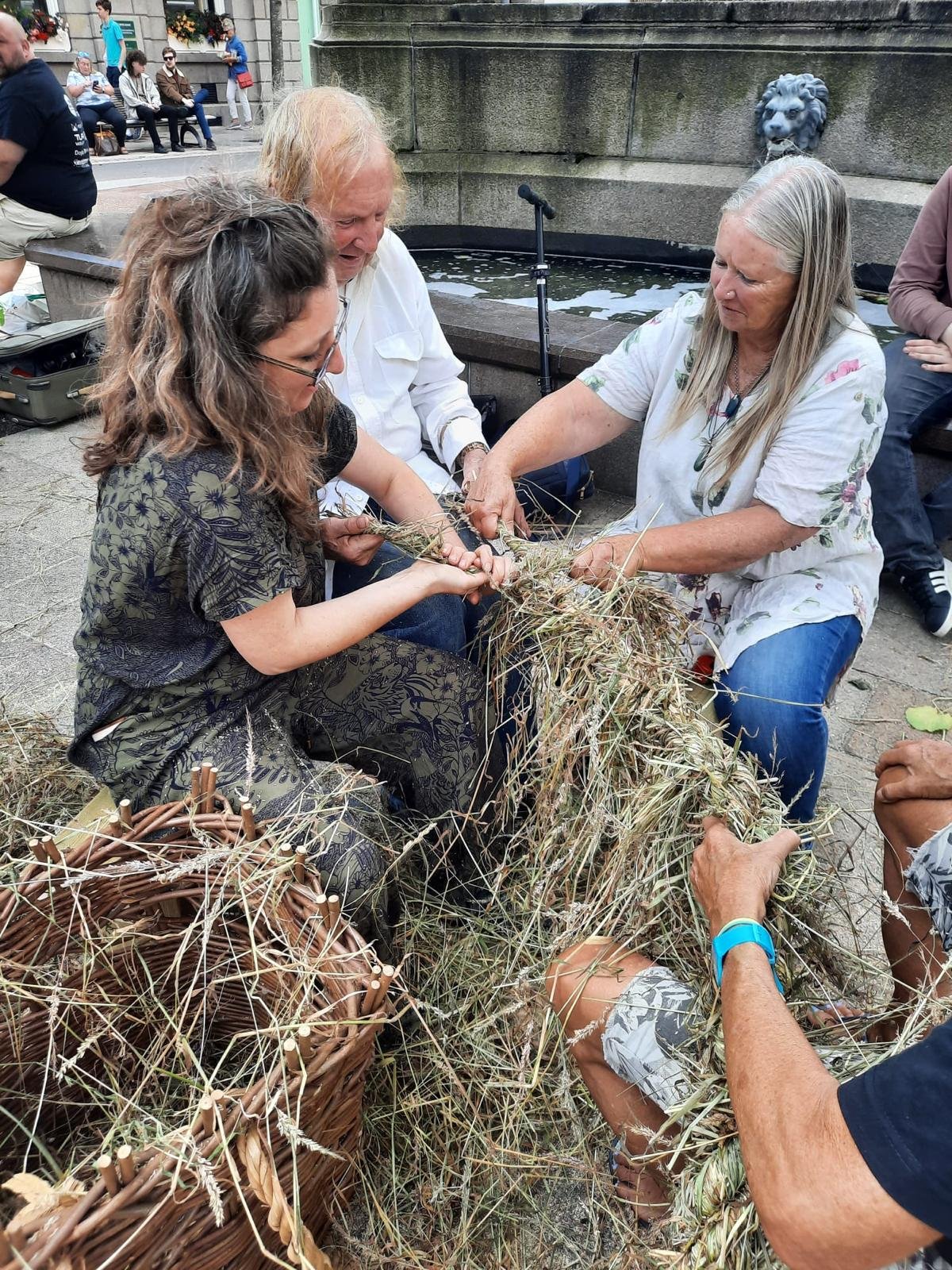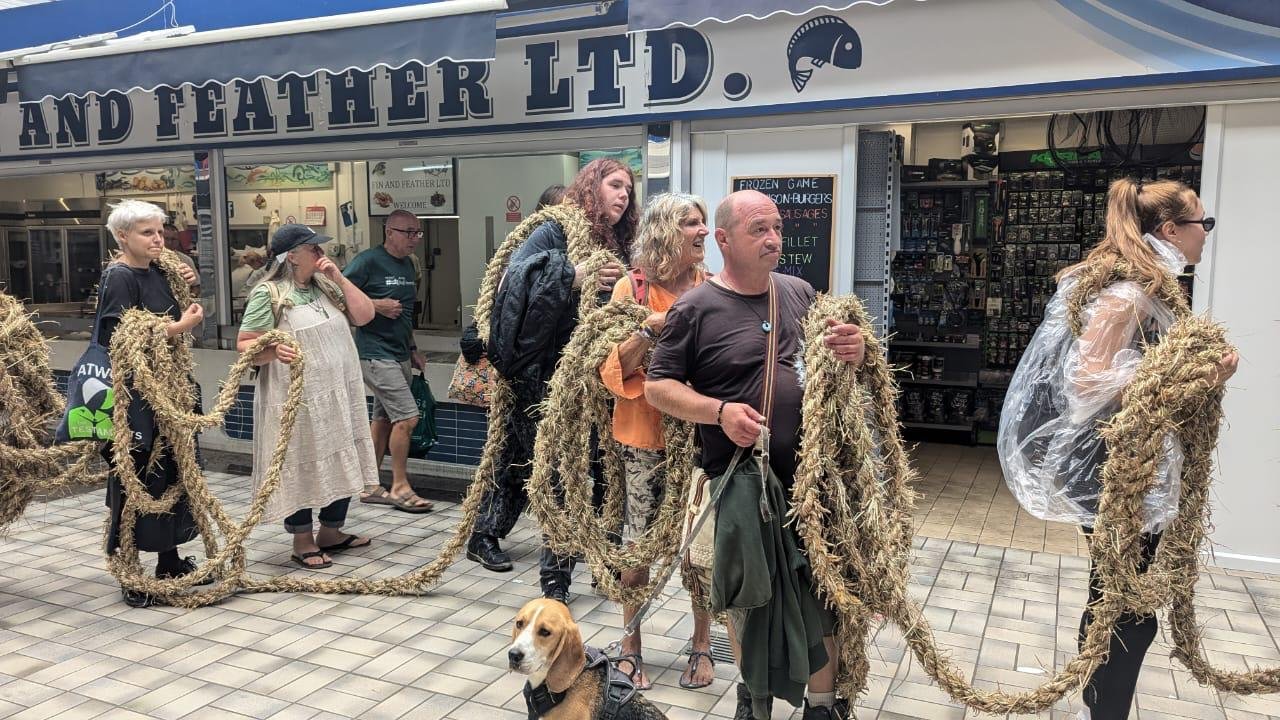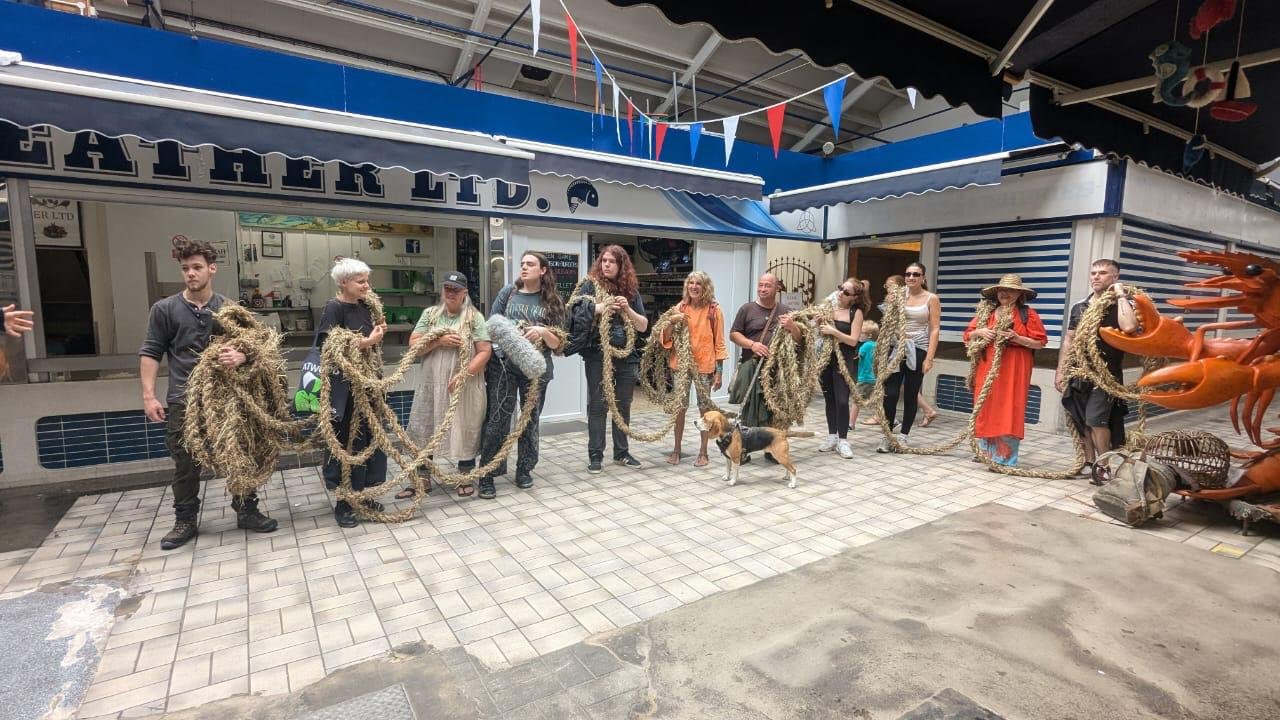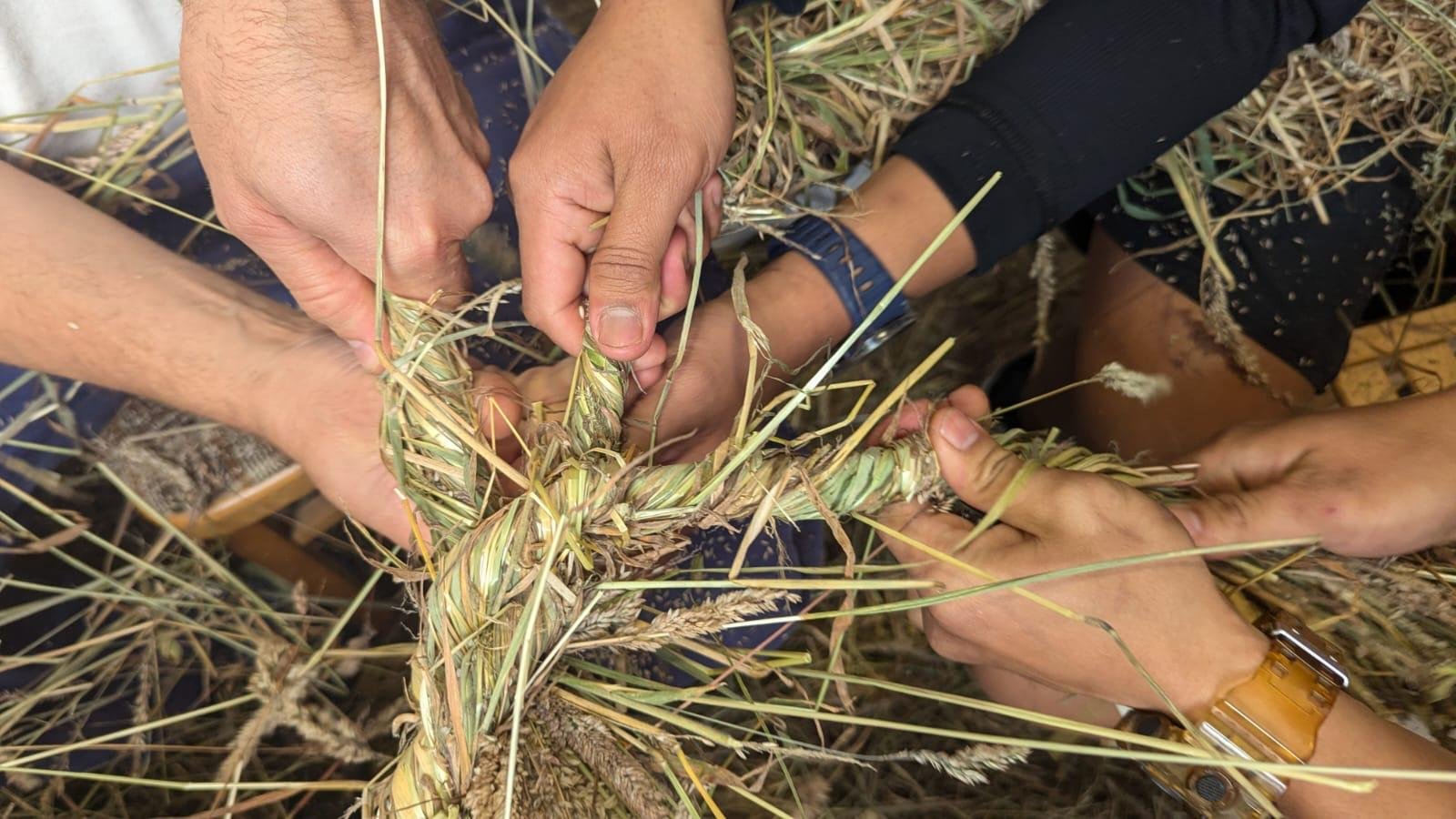
Abundant Futures: Food Politics
Click here for related events
Sponsored by Spoor & Fisher Jersey
Pictured: Pictured: Rope Making with William Bock (July 2024). Image by Scott Evans

A socially engaged project
Abundant Futures is a long-term, socially engaged project commissioned by ArtHouse Jersey, led by Dana Olărescu in collaboration with contributing artists, academics, and organisations such as dhaqan collective, Kaajal Modi, Olha Pryymak, William Bock, Mariana Pinto Leitão Pereira, and Counterpoints. Focusing on food justice, the project aims to amplify existing insights and expertise within migrant communities and native populations regarding sustainable growing practices, soil regeneration, and food resilience in the face of the climate crisis.
The project includes creative workshops for people from migrant backgrounds, visits from international artists working with plant, food, and soil knowledge, research interviews conducted by academic Mariana Pinto Leitão Pereira, and participant-led public sessions showcasing their resources, capabilities, and agency.
By using food as a catalyst, Abundant Futures honours the diverse knowledge and skills that participants bring from their homelands, fostering new cultures and working to nourish future generations.
To get involved, please click here to find upcoming events on Eventbrite.
Pictured right: Food Politics Workshop hosted by ArtHouse Jersey at Capital House, led by Dana Olărescu (May 2024). Image by Scott Evans







Pictured: Dana Olărescu during delivery of the project: Do You Dream of Labour. Image by Maxim Honcharuk.
Dana Olărescu
A socially engaged artist working at the intersection of performance, installation, and social design. Dana Olărescu focuses on challenging minority exclusion and environmental injustice. Through participatory methodologies that democratise access to art and knowledge, she aims to give agency to migrant individuals and groups to become active co-producers of culture. In 2021-2022, Dana participated in the 'Home' artist residency program with ArtHouse Jersey. During this time she collaborated with the local Romanian community and created artworks for the ‘Home’ art exhibition, which reflected on the diverse and multicultural essence of modern Jersey.
For Abundant Futures, Dana is building platforms where migrant communities on the Island can share their knowledge and lived experiences in other homelands, and co-build and amplify the ‘local’ through global voices and cultural diversity. So far, she has led workshops at both the Little Parliament and the Multilingual group at the Jersey Youth Service, Andium Homes, Lilly Market, ArtHouse Jersey at Capital House, and has had individual conversations with people as a way to invite them to run their own workshops in 2025.
By connecting with different organisations, stakeholders, and policymakers across the Island, Dana also aims to use art to engage in alternative conversations about migration, food resilience, and the building of strong cultures. If you would like to run a workshop, or get involved in the project, please get in touch with Scott Evans, Producing & Technical Assistant by e-mail at scott@arts.je.
danaolarescu.com - Instagram: @dana_olaresci
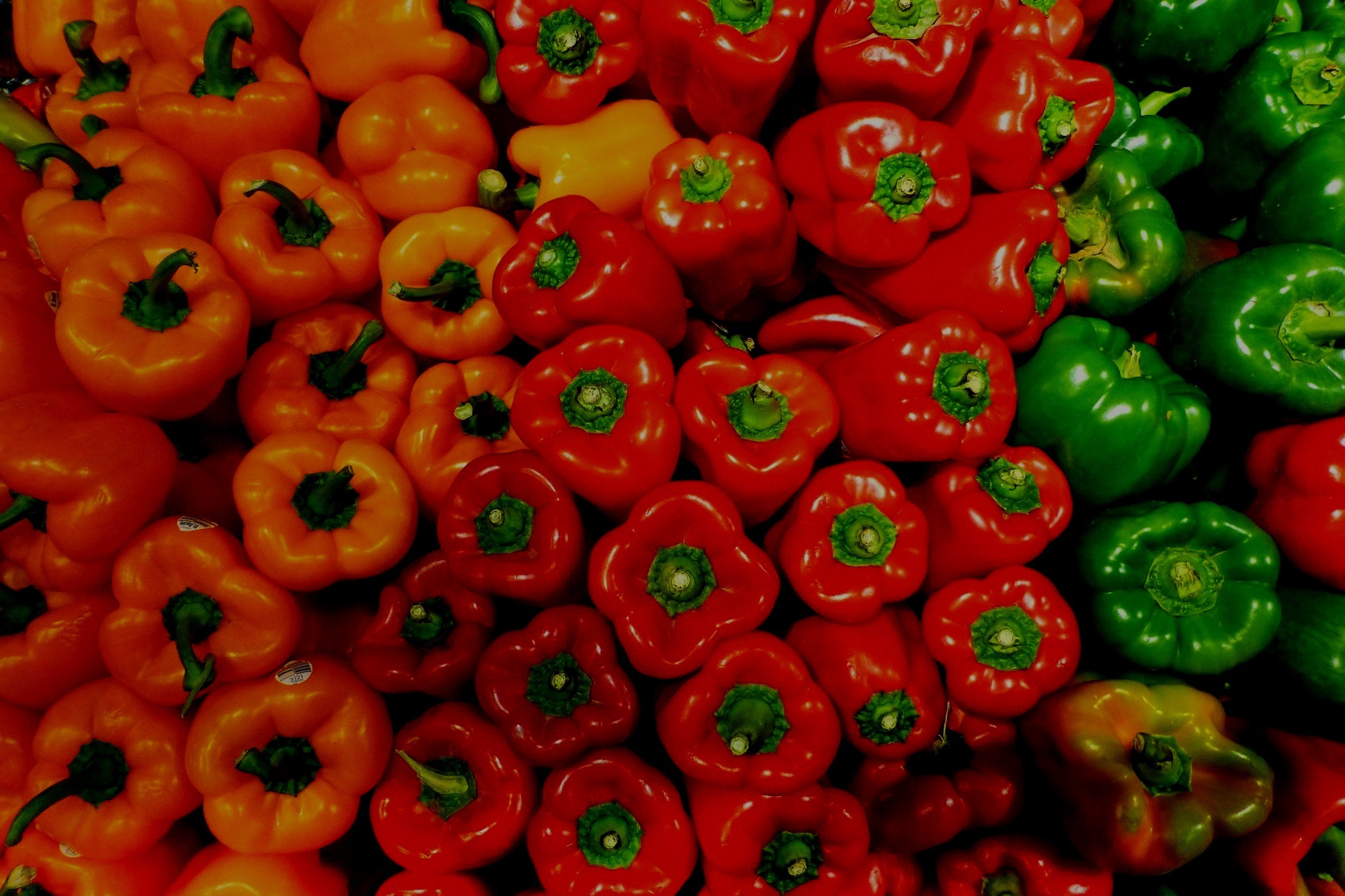
Olha Pryymak
Olha Pryymak is a Ukrainian-born, London-based multidisciplinary artist whose work explores the evolving relationship between people and the natural world. Drawing on Ukrainian folklore, she works across painting and socially engaged projects to examine how cultural memory, ecology, and care intersect.
Alongside her studio practice, Olha curates and facilitates collaborative projects that engage community, storytelling, and plant knowledge. Since 2016, she has led the Kupala Festival at Phytology’s Bethnal Green Nature Reserve in London, an annual event rooted in solstice traditions that brings together international artists to explore contemporary connections between nature, science, and art. The festival grew from her Kupala Tea performance, created in response to the site’s wild herb garden.
This year, Olha is bringing the Kupala Festival to Jersey - a celebration of the bond between people and nature through family-friendly activities, delicious nourishment, and vibrant Eastern European traditions. Highlights include floral crown-making, craft workshops, fireside singing and dancing, and culinary delights from the region. The festival will also feature immersive installations by Abundant Futures artists, honouring Jersey’s rich cultural heritage and diverse community.

Pictured: Fozia Ismail during a playtesting week for House of Weavings Songs as part of Playable Cities, Bristol (May 2023). Image by Omar Sultan.
Fozia Ismail - dhaqan collective
Fozia Ismail is a researcher, creative producer and artist. She is the founder of Arawelo Eats, a platform for exploring politics, identity, and colonialism through East African food and what it means for our understanding of belonging in a post-Brexit world. When not critically eating her way through life’s messiness she can be found plotting at the Pervasive Media Studio and Spike Island with her sister in arms Ayan Cilmi as part of dhaqan collective, a Somali feminist art collective in Bristol. The collective uses everyday materials, cassette tapes, food, textiles, to create spaces of communion, joy and healing that centre the full range of Somali diasporic experiences. Their creative ecology is rooted in the collective thinking of Somali nomadic life and the creativity at its heart.
In Milk songs, here, there and everywhere, Fozia will be exploring migrant rituals, stories, and songs related to the act of milking. How do these milk traditions relate to the story of the people who inhabit the Island, past and present? What insights can we draw from exploring the intimacy of this relationship between people, land and animals through the lens of milk cultures and song. Running workshops to capture stories, Fozia will create a sound installation blending sounds from the Jersey Archive and participants’ voices. A Listening Event of the work-in-progress installation will take place at Hamptonne Country Life Museum in November 2024 supported by Jersey Heritage, and the full sound installation will be presented in 2025.
www.dhaqan.org - Instagram: @dhaqancollective

Pictured: Kaajal Modi as part of Kitchenette of Future Dust, Madrid (2019). Image by Sofia Victoria Rodrigo.
Kaajal Modi
Kaajal Modi (she/they) is a multidisciplinary artist and heritage researcher exploring how collaborative creative practices with diverse communities (human, ecological, and otherwise) can offer new ways of imagining the future. Their work spans food, medicine, spirituality, and storytelling, using practices like fermenting, foraging, and live interactions through co-creation to connect people, organisms, and ecosystems.
Kaajal joined Abundant Futures in April 2024 with Native Tongues, a project exploring the relationship between land, language, and food biodiversity. The project connects older Jèrriais speakers with migrant children learning the language to rediscover traditional practices of soil care and envision more generous relationships with other species. In partnership with L’Office du Jèrriais, Kaajal led six children on a seaweed foraging trip with Kazz Padidar, where they discovered seaweeds new to Jersey’s coastline, some of which lacked Jèrriais names. The children named these species, and their contributions will be reviewed by Société Jèrriais for inclusion in the official dictionary.
Trudie Trox of Jersey Walk Adventures taught Kaajal how to forage and prepare seaweeds, which later inspired a Native Tongues dinner, featuring dishes like sea spaghetti and chocolate pudding set with Irish moss. Local Jèrriais band Meli Melo performed, and Emily de Gruchy shared the history of the traditional bachîn.
Kaajal is now designing a pack of cards featuring a foraging map, recipes, and the newly named seaweeds, which will be distributed to schools across Jersey in early 2025. This project is made possible with the support of L’Office du Jèrriais.

Pictured: May Daily XXVI (for sore eyes) 2023. Image by William Bock.
William Bock
William Bock is a multi-disciplinary artist based in south west Ireland and working internationally. His work explores relationships between people and the environments they inhabit. Drawing from folk traditions and vernacular history on the land, William creates socially engaged projects rooted in place that engage with experiences of migration, ecology, colonial history, climate change, and identity. William brought his Green Rope project to Jersey which uses the act of Sugán rope making (an Irish straw rope) to bring people, nature and conversation together across cultural and social barriers.
In May, William connected with local fishers and individuals with experience or memories of making rope, and led an all-day workshop on film-making using smartphones. Four participants, Amanda Bond, Luca Purcaru, Mylie Timms, and Vi Murphy, were selected from the workshop to use their phone cameras to capture footage during rope-making sessions in July. In July, William returned to conduct rope-making sessions over four days. His time was divided between setting up a stall at the Fish Market, where passersby stumbled upon the activity, and working in a public space off Broad Street. Rope-making requires four participants to twist the rope, which naturally encourages conversation among them. Over 800 people engaged in the activity, culminating in a public rope walk procession at the end of the week. Travelling from port to port, the 80 metre-long rope was carried by 17 people from La Rocque to St. Helier. Trudie Trox of Jersey Walk Adventures joined at the oyster beds to explain the cultivation process before the walk continued, with everyone connected by the rope. In 2025, a short film edited by William will be presented.
williambock.com
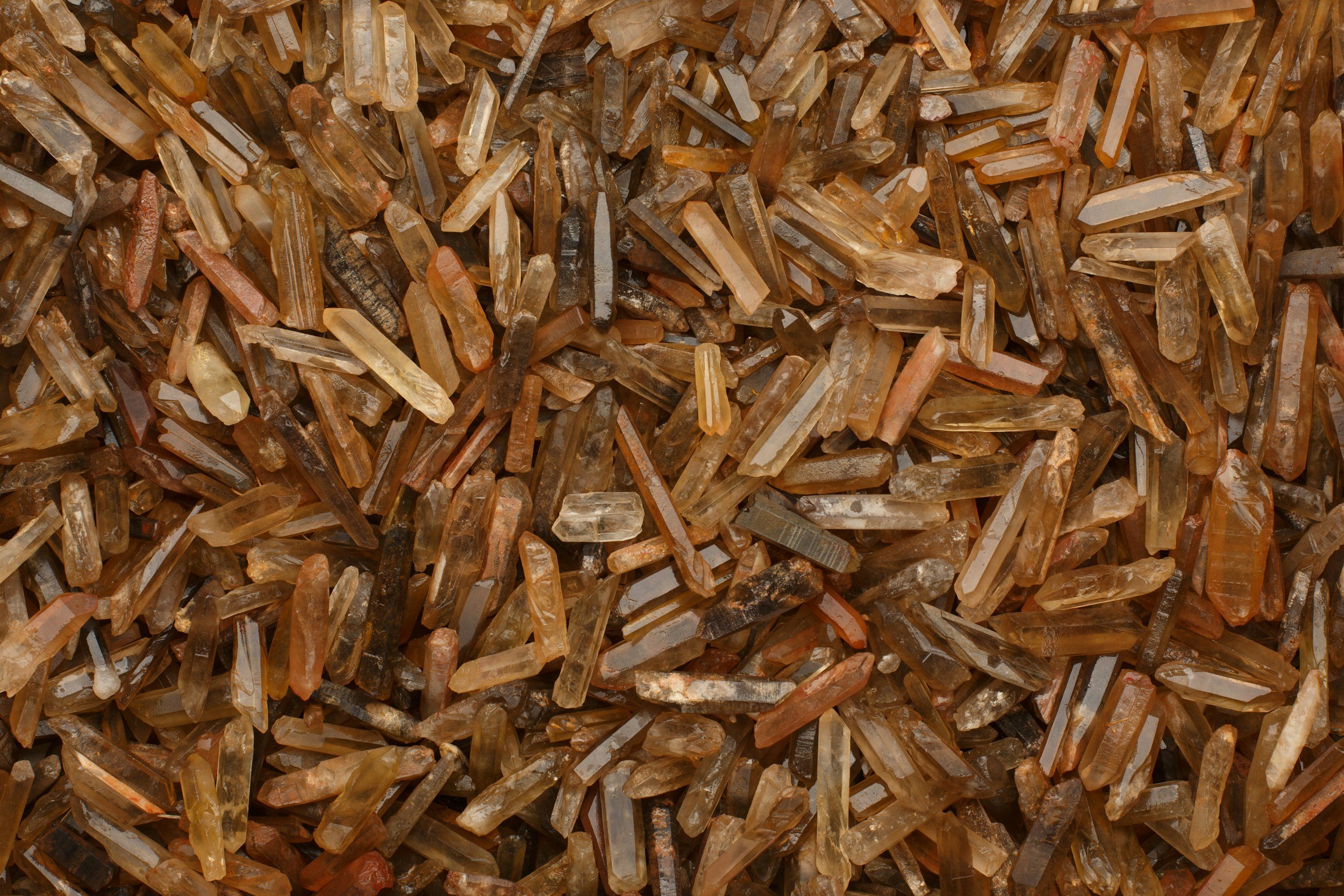
Pictured: Mariana Pinto Leitao Pereira
Mariana Pinto Leitão Pereira
Mariana Pinto Leitão Pereira is a Postdoctoral Research Associate at the Heritage for Global Challenges Research Centre in York, where she looks at how migration between waterscapes and landscapes shapes cultural heritage, belonging, and ways of knowing the world. Her aim is to document and understand how heritage is harnessed by communities in contexts of displacement. For her PhD research, Mariana was based at the Cambridge Heritage Research Centre at the University of Cambridge, where she focused on the ways diaspora communities use cultural heritage to construct and navigate identity. Her PhD was funded by Portugal’s Foundation for Science and Technology and her case study sites were two cultural events organised by the Macanese in Portugal and Portuguese-speaking communities in Macau (China); Mariana comes from the Portuguese-descendant community of Macau, the Macanese.
Mariana will be supporting Abundant Futures with research and data collection. Her work will focus on investigating whether migrant-led social change on a larger scale is possible, as well as the challenges, opportunities, lessons learned, and impact of such efforts. This will involve conducting interviews with project participants, meeting with stakeholders, and creating a report with recommendations for policymakers.
